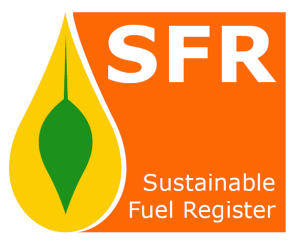Sustainable Fuel Register – Nearly ready to accept online applications!
 It’s been quite a journey but we are almost ready to accept online registrations! We initially approached Ofgem in November 2014 with the idea of setting up a non-wood fuel suppliers list and almost two years later the Sustainable Fuel Register (SFR) is about to receive Secretary of State approval.
It’s been quite a journey but we are almost ready to accept online registrations! We initially approached Ofgem in November 2014 with the idea of setting up a non-wood fuel suppliers list and almost two years later the Sustainable Fuel Register (SFR) is about to receive Secretary of State approval.
SFR will plug a gaping hole. Until now anyone wishing to claim Renewable Heat Incentive (RHI) revenue and use non-wood fuels such as miscanthus or straw have had to self-report against the sustainability criteria. This was onerous and expensive. In addition, traders of non-wood biomass (such as miscanthus pellets) had no mechanism for demonstrating the sustainability credentials of their products and therefore the RHI market has been frustratingly closed to these operators. By contrast suppliers, traders and users of wood fuels were serviced by the Biomass Suppliers List (BSL) – a free service helping the woodfuel supply chain demonstrate compliance. The creation of SFR levels the playing field. As a result tens of thousands of previously unavailable biomass will be available for use in RHI biomass projects.
SFR has been brought about by collaboration between FEC Energy (formerly the Farm Energy Centre) and Crops for Energy. Both organisations are specialists in biomass consultancy and have considerable experience of RHI applications, independent metering reports (IRMAs), sustainability reporting and the economics and logistics of biomass energy production and use.
A lot has happened in the two years since the SFR scheme was proposed.
There have been name changes and reorganisations. The original name for SFR was the somewhat less catchy Wastes, Residues and Energy Crops Sustainability List or WRECSL. Also, Farm Energy Centre has rebranded as FEC Energy. Finally, following Brexit and the appointment of Theresa May as the new Prime Minister the Department of Energy and Energy and Climate Change (DECC) was subsumed by the Department for Business, Energy & Industrial Strategy (BEIS).
There have been personnel changes. We’ve dealt with four central contacts at DECC due to people leaving their jobs or being reshuffled. On top of this this we have had to deal with other distractions that have hindered rapid progress such as the formal introduction of the sustainability criteria, the RHI consultation, the tender of the BSL, Brexit, and changes to the RHI regulations affecting combined heat and power (CHP) projects.
During this time the UK biomass industry has been buffeted by the consequences of RHI tariff degressions. Back in December 2014, tier 1 of the small biomass tariff was worth 7.72p/KWh. Since then it has been degressed eight times and now stands at 3.10p/kWh. This has had a catastrophic effect on the number of companies installing small–medium biomass systems. When the industry was at its peak there were 1,085 Microgeneration Certification Scheme (MCS) registered companies involved in biomass. This has now fallen to 549 companies.
SFR has been created without a penny of Government support. This is quite an achievement of which we are very proud. So far we’ve committed hundreds of man hours to setting up the scheme and producing hundreds of pages of procedures and protocols and guidance notes in order to get Secretary of State approval. On top of this we’ve completely self-funded the website and online registration portal.
We believe there are around 300-500 users of non-wood fuels that were affected by the absence of these fuels from the BSL. We have already helped around 100 of our clients to self- report and now will be able to help others. In addition we anticipate that the lifting of this barrier will encourage traders of non-wood fuels to show interest in supplying the 25,000+ biomass boilers installed under the RHI. Our efforts have been welcomed by the industry with particular interest shown by producers of pellets produced from spent coffee grains and miscanthus grass, major straw producers and stable yard owners (who have copious quantities of straw and wood chip mixed with manure to deal with).
In the vast majority of cases these are highly sustainable biomass sources that could service very local markets. As a result, consumers (with compatible boilers and who are in possession of appropriate emissions certification) will be able to access cheaper fuels. Furthermore, by creating markets for wastes and residues there is likely to be less export of straw and less material going to landfill.
SFR is a paid for service. There’s a flat registration fee of £125 which covers the production, trading or use of 125 tonnes of fuel. This will cover most self-suppliers with sub 200 kW boilers. Larger producers, traders and users will be charged £0.50 per tonne for each additional tonne above this. The scheme is flexible so that an amount that is registered is not time limited and is valid until it is used or traded on.
We believe that the increases traceability that the SFR system provides will help raise the bar and give assurance that accredited fuels being used in RHI funded projects are 100% sustainable. Our aim is to make this system as simple as possible for users and provide them with all the guidance and assistance to meet the obligations of the RHI scheme and ensure that accurate records are kept for auditing purposes.
It’s been a long journey to get here but we truly believe that the Sustainable Fuel Register will be a welcome addition to the fold and provide easy, affordable sustainability compliance.